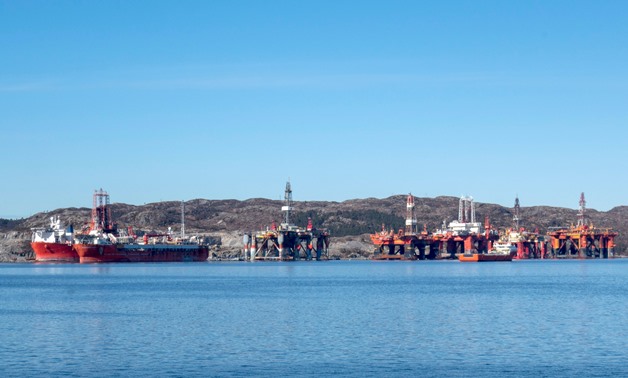
Drilling rigs and ships anchored in Skipavika, Norway April 1, 2018. REUTERS/Gwladys Fouche/File Photo
CAIRO - 11 April 2018: Egypt will significantly take part in Saudi-Emirati project, the Salwa Canal, as the Saudi-UAE investment alliance seeks to benefit from the Egyptian experience in the drilling industry.
On Monday April 9, the Saudi Border Guard Forces controlled the Salwa crossing border with oil-rich Gulf state, Qatar, according to Saudi local media outlets on April 10, disclosing that the Saudi customs and visas departments have been evacuated from the crossing border zone, in preparation for the official launch of The Salwa Canal.
Egypt has played a pioneering role in the development of the drilling industry in all countries it operated in, most notably Saudi Arabia, Gabon, Libya and Syria. As early as the 1860s, the Egyptian government began drilling for oil.
Saudi media revealed that the Salwa Canal will be carried out by Saudi and Emirati investors, while the channel, which has been discovered a few days ago, will be entirely under the Saudi sovereignty.
Along the Saudi-Qatari borders, a Saudi military base will be established, in addition to a landfill for the Saudi nuclear plant that Saudi Arabia is planning to build, while the UAE nuclear landfill is expected to be located close to borders with Qatar, according to Saudi-owned Al-Riyad newspaper.
Geo-politicians manifested that the Saudi future projects along the Qatari border, including the Salwa Canal, will grant the kingdom a geostrategic influence over the Salwa Island which embraces Qatari territory.
"When Saudi Arabia succeeds to implement the Salwa Canal project, Qatar will not be an independent island like Bahrain, but it shall be a part of the Salwa Island which partially lies under the Saudi sovereignty," geopolitics experts told Al-Riyad newspaper.
Doha has not responded officially to the news, and also Riyadh has not disclosed the actual timing of launching the Salwa Canal project, which may turn Qatar into the second Gulf state lying on an island.
Egyptian drilling expertise
For the gold industry, Sukari Gold Mine, Egypt’s sole gold-exporting mine, produced around 100 tons of gold since it started operations in January 2010, with an average monthly production of 1.2-1.5 tons of gold.
Petroleum Minister Tarek el-Molla said in late December that the Sukari Gold Mine has contributed a total of $250 million in revenues to the government since it started production in 2009.
The government said that it aims to increase the mining sector's contribution to the GDP to more than 5 percent. It currently contributes around 0.5 percent of the GDP.
Molla said that the government is working to identify the challenges facing the sector and that his ministry aims to boost investments by amending the sector's administrative and legislative systems.
Located in the south-easternmost region of the Eastern Desert, Sukari mine is the first large-scale modern gold mine in Egypt, with a base case production rate of about 500,000 ounces per annum, according to the official website of Centamin.
For the oil sector, international oil and gas company APACHE plans to drill 50 wells in Egypt through the national companies Khaleda and Qaroun. The announcement came in March during Minister of Petroleum Tarek El Molla’s meeting with a delegation from APACHE headed by its CEO, John Christmas, in the presence of Egyptian geologist Ashraf Farag.
During the meeting, the attendees discussed the exploration portfolio in Egypt and the related investment opportunities, as well as the company’s future expansion plans in the country.
The meeting also took on the recent advances of the oil and gas industry regionally and globally. The minister reviewed the ministry’s achievements made in the petroleum sector during the recent period and the economic reforms adopted by the government to encourage and attract more investments in the Egyptian oil and gas industry.
For his part, the CEO of Apache discussed with Molla the company’s mechanism to increase production volume by utilizing the latest means of technology to counter the falling production rates of wells, confirming that the nation’s oil and gas drilling industry will witness a boom in the current fiscal year.
For the energy industry, Egypt aspires to become a regional energy hub, benefiting from its strategic location straddling the Suez Canal and the land bridge between Asia and Africa.
On March 15, chief executive of United Arab Emirates-based energy firm Dana Gas revealed that Dana will spend $47 million in Egypt this year but any new investments will be made only if the country pays some of the money it owes.
The money will go towards an ongoing drilling programme in Egypt where Dana has two to four wells and where work has already begun.
But with Egypt’s payments in the second half of 2017 being “sporadic and disappointing”, Dana is cautious about new investments. “Absent payment, absent investments,” Allman-Ward said.
Dana’s production in Egypt in 2017 was around 39,500 barrels of oil equivalent per day (boepd), up 5 percent year-on-year, it said in annual results.
In February, Italy’s Eni delivered the first gas from Egypt’s giant offshore Zohr field, which has an estimated 30 trillion cubic feet of gas.


Comments
Leave a Comment